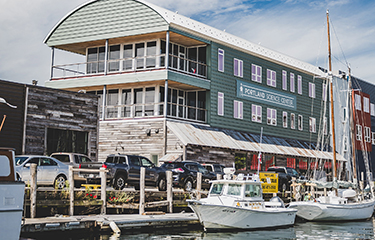For the past five years, the New England Ocean Cluster has been without the collaborative working space that the model thrives on, but that’s soon going to change.
The New England Ocean Cluster is based on the Iceland Ocean Cluster, and both locations share the same mission: To connect various entrepreneurs, businesses, artists, and other talented individuals in a collaborative space to enhance the region’s seafood industry. The cluster model is intended to bring together industries that, without it, may have had no reason to collaborate or connect.
Patrick Arnold, the co-founder and CEO of the New England Ocean Cluster, started the project after meeting the founder of Iceland’s ocean cluster, Thor Sigfussin, who started the model in 2012. Sigfussin approached Arnold about the possibility of starting a similar model in New England.
Iceland, Arnold said, has already demonstrated that bringing different industries together can enhance both the sustainability and value of seafood-based businesses.
“It was a model of cross-pollination, where you’re taking people out of their respective silos, and bringing them together in a physical space, so there can be productive and creative collisions that happen over a cup of coffee,” Arnold told SeafoodSource. “It’s been a wild and wonderful success.”
An example he gave is increased resource extraction – certain Icelandic seafood companies have begun collagen extraction, for use in the pharmaceutical and cosmetic industries, increasing the value of the product while also utilizing more of each fish. The process that lead to the creation of this new way to extract value was catalyzed by the Cluster, he said.
“If you silo off your industries, then the wherewithal to make that happen is often not local to the resource,” Arnold said. “When we’re talking about innovation and adding value, and stuff like that, it takes, not a village, but multiple villages.”
He compared the model to trade shows that bring together people within an industry to make business connections. Instead of a silo of one aspect of one industry, it brings together multiple types of industries, academia, and more – focused on a specific region.
“It’s the same sort of trade show mentality, but given locally to a community, a region, a state,” he said. “We saw this in Iceland, and you feel the buzz, it’s palpable, it’s different.”
A key to that model, however, is a co-working space that physically brings the members of different industries together. For the past five years, the New England Ocean Cluster has been functioning without one. Despite that it has still managed to jump-start certain initiatives – chitisin extraction from lobster processing is one example – proving the cluster model can make positive impacts on the industry.
Soon, the New England Ocean Cluster will move into its new space, dubbed “The Hús,” is in the works on the waterfront of Portland, Maine. Slated to be complete in March, the new space will feature collaborative working spaces, offices, and desk space.
Maine, Arnold said, is the perfect location for a cluster model to take root.
“Maine can be an incubation station. Maine is small enough to not warp or change best practices that come in; it’s small enough to embrace the best practices that we already have,” Arnold said. “That’s what the model the ocean cluster requires.”
Despite its relatively small population, Maine is still in close proximity to larger cities and their corresponding infrastructure, which can allow a new venture to scale.
“You don’t have to stay small. If you want to innovate and scale, you can scale right here in this region without going very far,” Arnold said.
The ultimate goal of the cluster, when it comes to any innovation, is to let the new companies that form go off on their own quickly.
“The Ocean Cluster can start a company and invest in it and push it forward,” he said. “That’s the ideal, you don’t want to be in the possession moment for very long.”
The cluster, he said, helps jump-start innovation by bringing together the elements needed to prove a model for a business could work, before letting that business take off on its own.
“This is all about focusing on the people, their ideas, their collaboration,” Arnold said. “All the ingredients are here, we’re just enhancing the kitchen we have to cook in.”
Photo courtesy of New England Ocean Cluster







